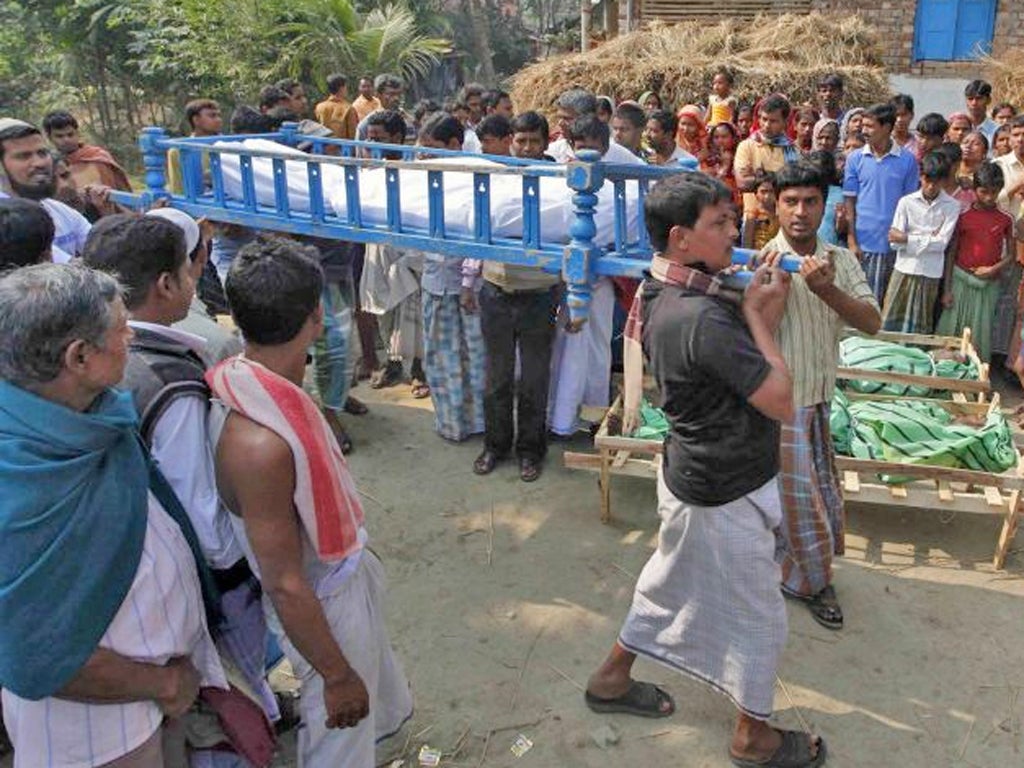Bootleg liquor with toxic additive kills 140
Villagers in West Bengal destroy shops that sold poison drink while police round up suspects

Your support helps us to tell the story
From reproductive rights to climate change to Big Tech, The Independent is on the ground when the story is developing. Whether it's investigating the financials of Elon Musk's pro-Trump PAC or producing our latest documentary, 'The A Word', which shines a light on the American women fighting for reproductive rights, we know how important it is to parse out the facts from the messaging.
At such a critical moment in US history, we need reporters on the ground. Your donation allows us to keep sending journalists to speak to both sides of the story.
The Independent is trusted by Americans across the entire political spectrum. And unlike many other quality news outlets, we choose not to lock Americans out of our reporting and analysis with paywalls. We believe quality journalism should be available to everyone, paid for by those who can afford it.
Your support makes all the difference.More than 140 people have died and many others made seriously ill in the east of India after consuming illegally made alcohol with a poisonous additive designed to give the spirit an extra kick. It is feared the death toll could yet rise further.
Officials in the state of West Bengal said villagers in the south of the state started falling ill earlier this week after consuming the liquor bought from shops alongside a railway track. Soon, dozens were vomiting, complaining of terrible headaches and frothing at the mouth. People were ferried to a series of hospitals, taken there by relatives and the emergency services. Furious villagers later destroyed the shops that had sold the alcohol and police arrested 10 alleged bootleggers.
Last night, the chief minister of West Bengal, Mamata Banerjee, vowed that there would be a full investigation into what had happened. “Consumption of illicit liquor is a social disease and this has to be eradicated. I want help from everybody and let’s not politicise the issue,” she said.
The incident that played out at the village of Sangrampur, south of Kolkata, is all too common in India. Every week, there are reports from cities and villages across the country of people dying after drinking the so-called “hooch”, which sells for a handful of rupees and is bought by labourers, rickshaw-pullers and farmers.
Reports suggest the production and sale of such alcohol is hugely profitable. But manufacturers often mix their product with other chemicals, such as methanol, which can cause blindness and death if consumed in sufficient quantities. Some reports suggest that two-thirds of all alcohol consumed in India is manufactured in this way. It costs around a third of the price of that which is sold in government-sanctioned shops.
Such is the scale of the problem that the authorities in the state of Gujarat, where there is a ban on all alcohol, have recently sanctioned the death sentence for those involved in the production and sale of illegal alcohol which kills people. The move followed the deaths of 157 people who succumbed after consuming a deadly batch of liquor in the city of Ahmedabad in 2009. At least 180 people died in 2008 in the southern city of Bangalore in similar circumstances.
Officials in West Bengal are concerned that more could yet die as a result of the poisonous brew, according to the Press Trust of India. Shikha Adhikari, chief medical officer for the district authority told reporters gathered at the hospital in Diamond Harbour: “The hooch toll has risen to 140 and over 350 are still in three different hospitals, many of whom are still battling for life.”
Police reportedly believe the alcohol came from an illegal distillery located in a village called Mograhat. It is said to supply up to 70 shops in the area. While 10 arrests have been made, police are still searching for the owner of the operation.
The alcohol deaths come just days after more than 90 people died when fire broke out in a hospital in Kolkata. Officials have accused hospital staff of saving themselves and leaving patients to fend for themselves. Several directors of the hospital have been charged over the deaths.
Join our commenting forum
Join thought-provoking conversations, follow other Independent readers and see their replies
Comments